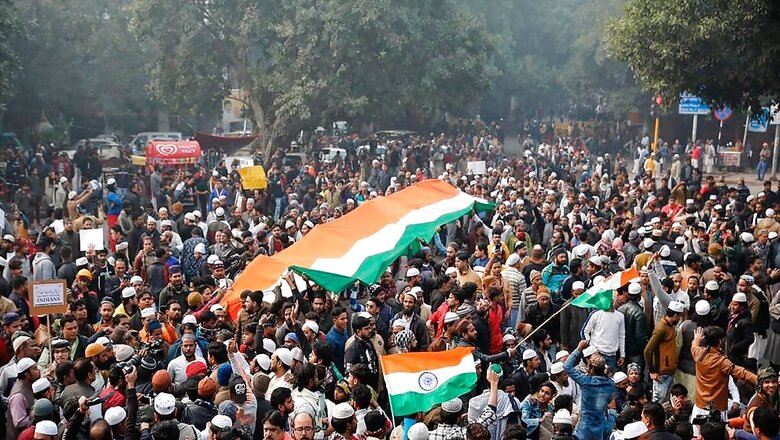
views
The Citizenship Amendment Act (CAA) has nothing whatsoever to do with India’s 220 million Muslims. Why then has the Indian Union Muslim League (IUML), a Congress ally in Kerala, petitioned the Supreme Court to “pause” the implementation of the CAA?
Moving beyond the interminably debated legalese in the CAA’s updated 39-page notified rules, what stands out is the contrasting reaction to the Act between the regressive Muslim who fears the CAA and the progressive Muslim who welcomes it. The IUML had also petitioned the Supreme Court against the CAA when it was first legislated in 2019. Then, as now, it called the Act “unconstitutional”. It added that it was “discriminatory” against Muslims.
IUML is wrong on both counts. The CAA is not unconstitutional. The Supreme Court has not ruled for over four years on more than 250 petitions against the CAA that have piled up in its registry since 2019.
If the apex court, currently in deep activist mode, had felt even a tremor of unconstitutionality in the CAA, it would have acted speedily as it has in other recent matters.
IUML is also wrong to say that the CAA discriminates against Indian Muslims. It does not. In fact, the CAA has no bearing at all on Indian Muslims.
The Indian government is a poor communicator and has allowed falsehoods that surround the CAA to gain currency.
Qatar’s Al Jazeera, which lacks credibility on inter-faith issues, was emboldened to write on 11 March 2024: “The CAA law was declared ‘anti-Muslim’ by several rights groups for keeping the community out its ambit, raising questions over the secular character of the world’s largest democracy.
“Muslim groups say the law, combined with a proposed National Register of Citizens (NRC), can discriminate against India’s 220 million Muslims — the world’s third largest Muslim population. They fear the government might remove the citizenship of Muslims without documents in some border states.
“Human rights groups have alleged that the mistreatment of Muslims has increased under Modi, who took over as prime minister in 2014. The country, since then, has seen a rising number of attacks against Muslims and their livelihoods, including the demolition of Muslim homes and properties. Cases of mob lynching under the pretext of protecting cows, considered holy by some Hindus, have also increased during Modi’s time in power.
“Critics believe the often-armed cow vigilantes, which used to operate on the fringes of society, became mainstream after the BJP took over. Reports of hate speech against Muslims have also increased in the country, averaging nearly two anti-Muslim hate speech events per day in 2023.”
The progressive view
It took a secular Muslim from the All-India Muslim Jamaat to rebut both the IUML and Al Jazeera’s communal and factually false position on the CAA.
This is what the Jamaat’s president Maulana Shahabuddin Razvi Barelvi said: “The government of India has implemented the CAA law. I welcome this law. This should have been done much earlier but better late than never. There are a lot of misunderstandings among Muslims regarding this law. This law has nothing to do with Muslims. Earlier there was no law to provide citizenship to non-Muslims coming from Pakistan, Afghanistan and Bangladesh who faced atrocities based on religion.
“Crores of Indian Muslims will not be affected by this law at all. This law is not going to take away the citizenship of any Indian Muslim. In the past, it has been seen that there were protests. Some political people created misunderstandings among Muslims. Every Muslim of India should welcome the CAA.”
Why did the Indian government exclude Muslims from members of the six faiths — Hindus, Sikhs, Jains, Buddhists, Parsis and Christians — who under the CAA will receive Indian citizenship on showing in the designated formal application that they are persecuted in three specific Islamic countries: Pakistan, Bangladesh and Afghanistan?
The exclusion of Muslims lies at the heart of the objection by those who oppose the CAA on grounds that it is discriminatory. They miss the point.
The CAA is designed to be anti-persecution, not anti-Muslim. In the three designated Islamic countries, minorities are severely persecuted. In Pakistan, for example, the population of Hindus has fallen gradually since Independence. In contrast, in India, the population of Muslims has risen steadily.
But aren’t Ahmadiyyas, Balochis and other Muslim sects also persecuted in Pakistan? They are, but the CAA is based on religion, not sub-religion sects.
Seventy years later
The initial Citizenship Act was legislated by the Jawaharlal Nehru government in 1955. India has long recognised the problem of Hindus and other minorities in neighbouring Muslim-majority countries. It has taken nearly 70 years for the government to amend the 1955 Citizenship Act and notify its rules in the CAA.
The reaction of Muslim parties like the IUML and AIMIM reveals their deep opposition to modern secularism.
By deliberately misleading their followers that the CAA discriminates against Indian Muslims — when it clearly does not — such political parties whip up communal sentiment. It led to the 2020 Shaheen Bagh protests and subsequent Delhi riots that took 53 lives.
The BJP, not surprisingly, is using the CAA and the hostile reaction against it by regressive Muslim groups to polarise the electorate before the 2024 Lok Sabha election. By falling into this trap, Muslim leaders are again letting India’s 220 million Muslims down.
Those 220 million Indian Muslims need progressive leadership, not misleading communal rhetoric.
The IUML and AIMIM in India and Al Jazeera and the myopic Western media can’t — or deliberately don’t — distinguish the secular wheat from the communal chaff.
The writer is an editor, author and publisher. Views expressed in the above piece are personal and solely those of the author. They do not necessarily reflect News18’s views.




















Comments
0 comment